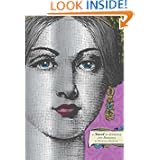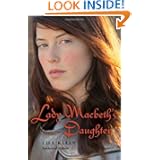What I've Read This Week . . .
Book reviews and random ramblings about literary and historical matters.

Friday, February 18, 2011
What I've Read This Week
This take on Shakespeare's play is told in alternating viewpoints with Grelach, Lady Macbeth and Albia, the daughter, telling the story. Grelach is the granddaughter of a king and expects that her father will inherit one day until her grandfather is murdered and King Duncan puts himself on the throne. Grelach is married off at 13 to a man twice her age, whom she detests. She gives birth to a son, Luoch, whom she also dislikes. When her husband is murdered by Macbeth, Grelach's father forces her to marry Macbeth. Macbeth is younger and more handsome than her first husband and Grelach thinks she can grow to feel affection for him, however, he has a nasty temper and a war-like nature that Grelach fears. Macbeth has been told by an "oracle" that he will have many sons and he looks forward to the birth of his first child. When the child is born female and with a crooked leg, Grelach fears for the safety of the child she loves. When Macbeth learns the baby is a girl and "deformed" he sends his henchman out into the woods to leave the baby for the wolves. The baby is rescued by Lady Macbeth's lady-in-waiting Rhuven, and given to her sisters to raise peacefully in the woods. Albia grows up believing Geillis is her mother and knowing nothing of the dramatic events that are to happen thanks to her aunt Helwain's prophecy. At age 14, Albia is sent to live with Banquo and his wife and grows to love her foster brother Fleance. Meanwhile, Grelach has been unable to provide Macbeth with sons. Scared for her life, she fosters his ambition in hopes that he will adopt her son and her family will return to the throne. Albia finally learns the truth about her heritage from a dying Geillis and also discovers that she has second sight. When Macbeth's perfidious deeds personally affect Albia, she desires revenge. Assisted by her friend Colum, the shepherd, she sets off to destroy Macbeth. Colum reminds her there's a difference between revenge and justice and Albia must decide which path she is to choose in order to save the kingdom and protect the man she loves. Lisa Klein says in her author's note that she drew on the true history of the period as well as Shakespeare's source material and the play itself. Her research really shows through in the wonderful, descriptive period details. The plot is a bit confusing and gruesome with too much killing shown. The ending is a bit confusing and open-ended. Grelach is not a character that readers are meant to like but she does inspire some sympathy and she could probably argue a convincing case that none of the destruction was her fault and she was an innocent victim. Albia is not very likable either. Her romantic plot isn't very convincing and if it were not part of the story, I think the story would have been a bit stronger. Overall though, the writing is really good (especially Shakespeare's) and though this book was written to be read alongside the play or just after, it works well as a stand-alone. I think high school students who have an interest in history and/or Shakespeare will really like this book.
Subscribe to:
Post Comments (Atom)


Michaela MacColl's book sounds awesome! Love the cover.
ReplyDelete